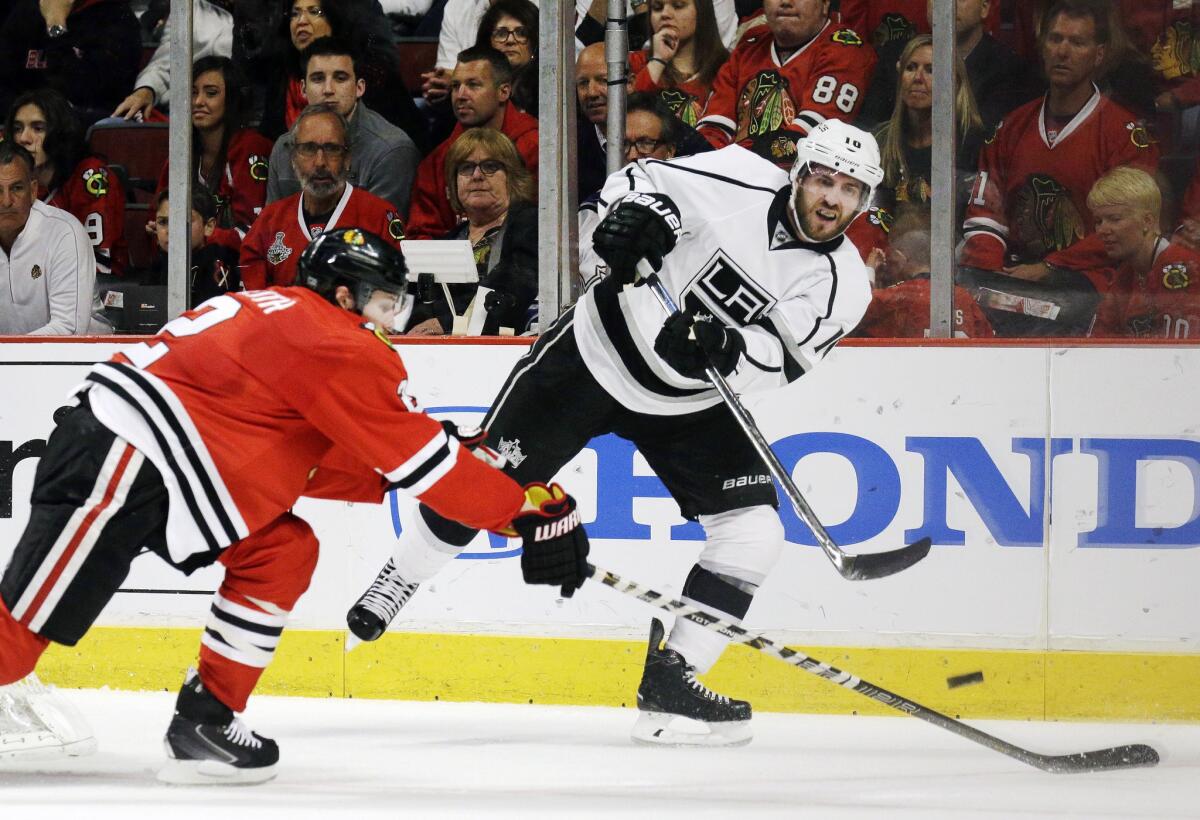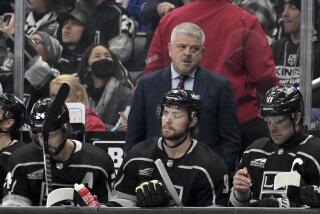Kings terminate Mike Richards’ contract, could face battle with NHLPA

Kings center Mike Richards passes against the Blackhawks in 2014.
The Kings moved to sever their relationship with center Mike Richards by terminating his contract, citing “a material breach” by the player.
This could unleash a fierce and protracted battle with the NHL Players Assn., which has 60 days to file a grievance but is expected to do so sooner. The Kings did not expound on their decision in a three-paragraph statement issued Monday.
It is thought the Kings recently received information leading them to make such a move, according to individuals with knowledge of the matter but not authorized to comment. On Sunday, they placed Richards on unconditional waivers — seemingly moving to buy out his contract — but changed direction shortly after he cleared waivers Monday.
“The Los Angeles Kings today have exercised the team’s right to terminate the contract of Mike Richards for a material breach of the requirements of his Standard Player’s Contract,” the team said in a statement. “We are not prepared to provide any more detail or to discuss the underlying grounds for the contract termination at this time.”
The NHLPA indicated the matter is not settled: “We are in the process of reviewing the facts and circumstances of this matter and will discuss the situation with the player in order to determine the appropriate course of action.”
NHL Deputy Commissioner Bill Daly declined to comment. Richards and his agent, Pat Morris, did not respond to requests for comment.
The Kings had been attempting to trade Richards in the lead-up to the NHL’s Entry Draft last week in Sunrise, Fla.
Sports law expert and professor Michael McCann said that proving “material breach” is generally a high threshold.
Under the buyout provisions, the Kings would have been responsible for $14.6 million of the remaining $22 million on the Richards contract. That amount would have been spread over 10 years, through the 2024-25 season.
“The NHLPA is likely worried about the precedent of a team voiding a player’s contract when that contract is drafted in way to be considered ‘guaranteed,’” said McCann, director of the Sports and Entertainment Law Institute at the University of New Hampshire.
“The NHLPA is probably concerned that if the Kings can void Richards’ contract for yet-to-be revealed reasons, could other teams escape their unwanted contracts by doing the same?”
McCann said Richards could eventually sue the Kings for breach of contract but only after exhausting his remedies under the collective bargaining agreement.
“Both Article 17 of the CBA and the standard player contract indicate that a player can pursue arbitration for a contract dispute,” McCann said. “This means that Richards would first have to arbitrate his grievance before a court would consider his arguments. Courts are also deferential to arbitration awards, which may make it difficult for Richards to seek judicial redress.”
An individual familiar with the Kings’ approach but also not authorized to comment suggested the morals clause in the standard player’s contract is the basis for the termination. The clause reads: the player also agrees “to conduct himself on and off the rink according to the highest standards of honesty, morality, fair play and sportsmanship, and to refrain from conduct detrimental to the best interest of the Club, the League or professional hockey generally.”
Etc.
As expected, the Kings issued qualifying offers to six players: Andy Andreoff, Nic Dowd, Vincent LoVerde, Nick Shore, Jordan Weal and Andrew Crescenzi.
More to Read
Go beyond the scoreboard
Get the latest on L.A.'s teams in the daily Sports Report newsletter.
You may occasionally receive promotional content from the Los Angeles Times.







